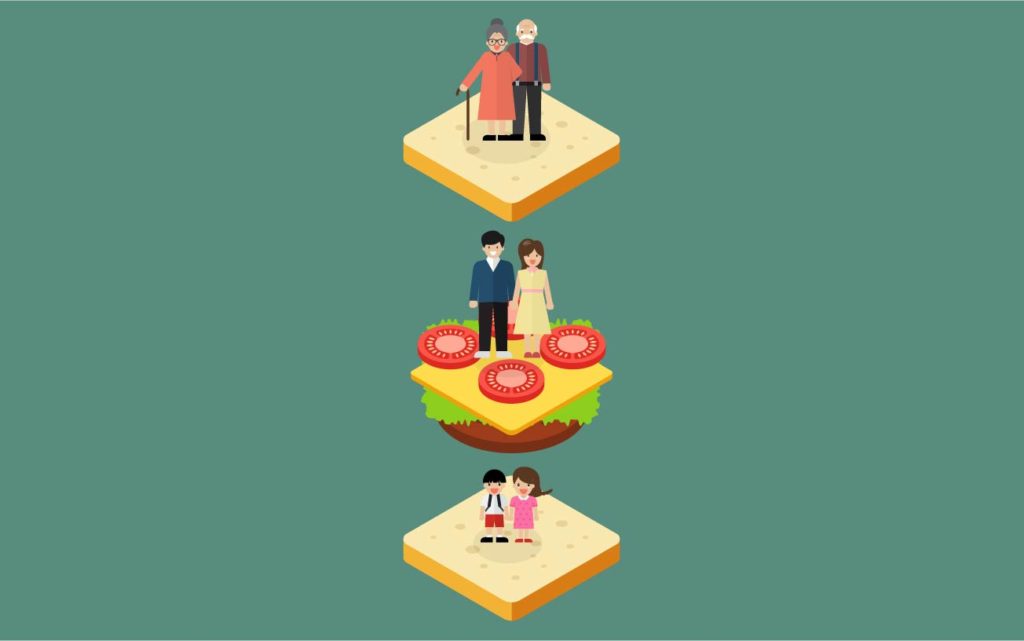You have a lot of responsibility on the shoulders if you are someone who has to take care of your children as well as your elderly parents, just as your parents would have had when you were young. With your parents and kids, you have emotional and financial obligations, and you are officially part of the sandwich generation. So, what is the sandwich generation? If you have never come across this word before, you will probably ask this question. Read on to know the problems of the sandwich generation.
What Is Sandwich Generation?
It is said that people who take care not only of their young children but also of their elderly parents are those who belong to the sandwich generation. In spite of dual duty and immense pressure to take care of young children and aging parents, many Americans have admirably shouldered this position. People are considered to belong to the sandwich generation in their middle adulthood.
The ‘sandwich generation’ in the United States has risen dramatically in the 2000s relative to the 1900s. According to the report, this change is largely accepted in the light of a large rise in life expectancy between 47 and 76.

Image Source – Thrive Global
Characteristics of Sandwich Generation
Here are a few demographics and characteristics of sandwich generation people:
- A higher proportion of caregivers or fall into the class of the sandwich generation is more married than unmarried adults.
- About 20 % of adults are 40 years of age or older and about 10 % of adults are 60 years of age or older.
- The majority of adults in this group range from 40 to 59 years of age.
However, both men and women are more caregivers than men. They belong to this generation. - Those who take care of their loved ones are mindful of their achievement and self-worth.
It is also shown that such a setup helps to create stronger relationships among generations.
Problem Of Sandwich Generation
It is definitely worth taking care of old parents and young children, but you will be tired of it. Some problems occur for people of sandwich generation who care for the elderly parents and children:
1. Financial Issues
The handling of financial issues is one of the aspects which upsets this generation. They have to spend more hours serving the needs of their families and children and have little or less time investing in jobs. Their investments are impacted and their wages can also have detrimental consequences. Some caregivers may also think that leaving their jobs may be an adverse tool to fulfill their duties and obligations.
2. Depression
Continuous pressure to deal with work and home can often become too daunting for caregivers to handle finance and various other aspects. For those unable to control stress, depression and other such disorders also occur.
3. Stress
The increased tension occurring when carers are immersed in the feelings that they are unable to complete or are able to do certain tasks is one of the most frequent problems faced by sandwich people. This creates anxiety and tension.

Image Source – GantDaily
Dealing With The Stress Of Sandwich Generation
Your health can be affected by a persistent feeling of worry and draining. So, if you’re too squeezed and too tight in the sandwich-generating effect, here are some ways to deal with stress:
1. Hire a Helper
If more people are to be taken care of, more obligations must be taken into account. Any of the jobs can still be done by recruiting help. In your household, for example, if you want to care for your sick person, you can recruit a kid to take your daughter to her music lessons or simply hire a full-time home help for the day-to-day activities.
2. Talk to People
You can offer some solace to your stressful mind if you speak to friends, siblings, family members, or even a support group. It can help you to feel better by addressing your fears, concerns, and what you are dealing with. It can be helpful, in particular in support groups, where people with common struggles often find themselves and voicing their concerns with such like-minded people.
3. Share the Burden
You look after your parents and children, but that doesn’t mean you have to do it all alone. If your children are mature enough to assume some of your duties, you will share your responsibility with them. You can even ask your siblings to help by having medical appointments, shopping, etc. with your parents.
4. Take Care of Yourself
You may actually neglect to take care of yourself while caring for others. See people in your life who matter, but do not forget your own well-being. Find out time for workouts, go with friends, sleep, and other events of the day. You would be more able to care about those around you if you take care of your physical and emotional well-being.
5. Prioritize Tasks
You’re not a superhuman person who can do it all at once. Create a list of things to do in order of importance. First, get goals done and leave the rest for another day. Think of what you can do in one day instead of being overwhelmed with a lot of activities. Try to find ways to minimize your daily work.
6. Assess Your Financial Situation
Before making any significant financial changes, you must analyze all available resources with you. Your financial needs must be prioritized and your retirement objectives must also be kept in mind. A scenario in which your parents can pay their own money while fighting to meet the needs of your child while postponing their own retirement savings plans can be awful financial. Be careful not to make financial mistakes like this and carefully consider your situation.
7. Be Clear About Their Desires And Interact Well
Now that you’re taking care of your parents and children together, the aspirations of the people concerned should be clear to you. This suggests that if you are not financially sound to take care of the health problems of your parents, speak to them about your financial situation and ask them if they can support you with their savings by pitching in. Money problems can get worse if left on vague grounds, so be very explicit and honest with your parents about them.
8. Get Professional Assistance
If you can’t work out your finances and how you’re going to deal with them, well, there’s always a specialist that can do it for you! Get the support of a consultant who can study and advise you on how to change your financial plan for different time intervals!
There is no question that it can be very demanding for the so-called Sandwich Generation to take care of two separate age groups. You’re bound to struggle and feel overwhelmed if you’re part of the sandwich generation, but note that your parents are growing old, and more than anything, what they need from you is emotional support. Don’t forget to look after and provide emotional support to your elderly parents. Similarly, your children will soon grow up and continue and live their own independent lives. You may feel burdened with the responsibility of caring for parents and children, but they are also a testimony to how lucky you are in your life to have them.
Kudos to you for the thing that you do for loved ones, if you belong to ‘sandwich generation.’ At times, it can get stressful but note that you do it for your loved ones. Wherever and whenever the need arises, ask for support and assistance, and lead a safe and happy life with the ones you love and live for!
Also Read: How To Fill Generation Gap Between Parents And Child?













